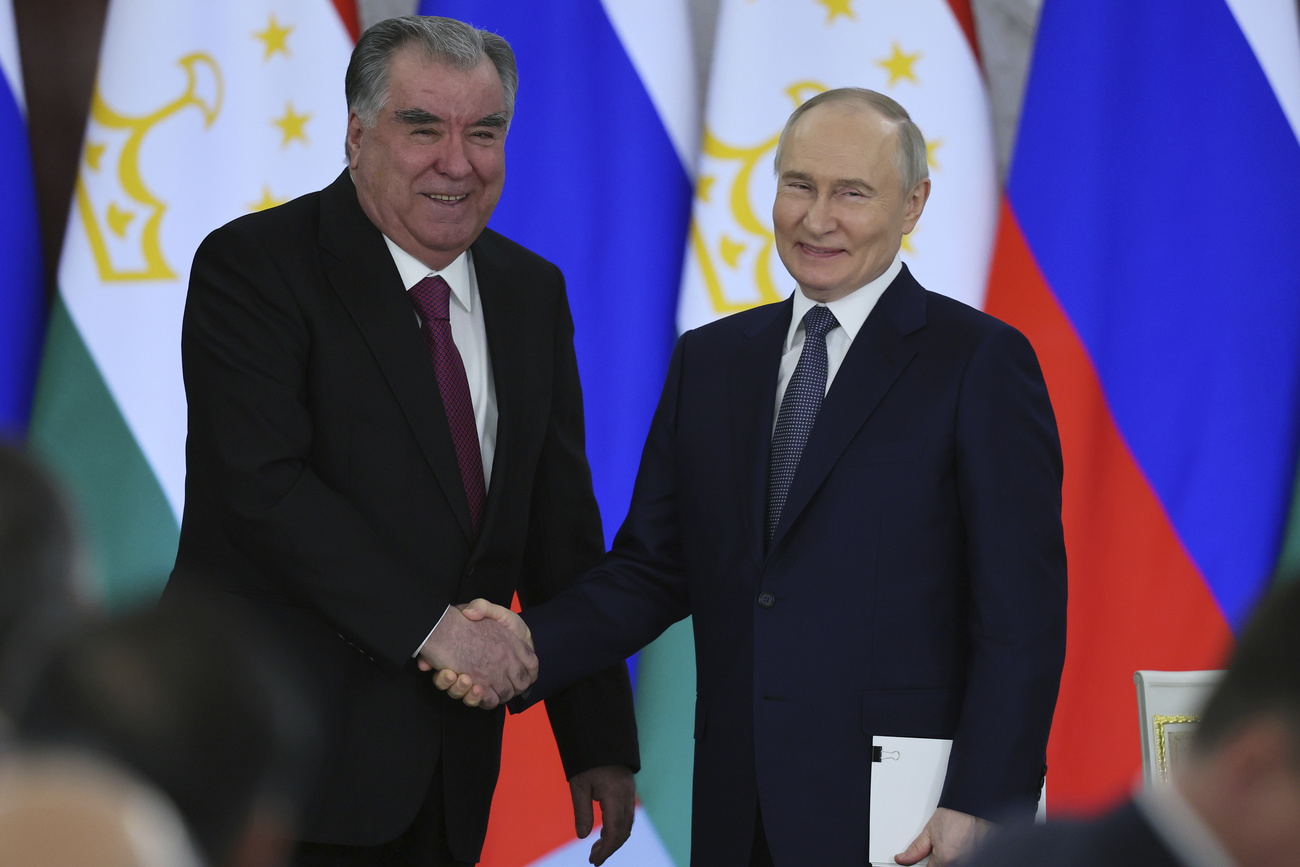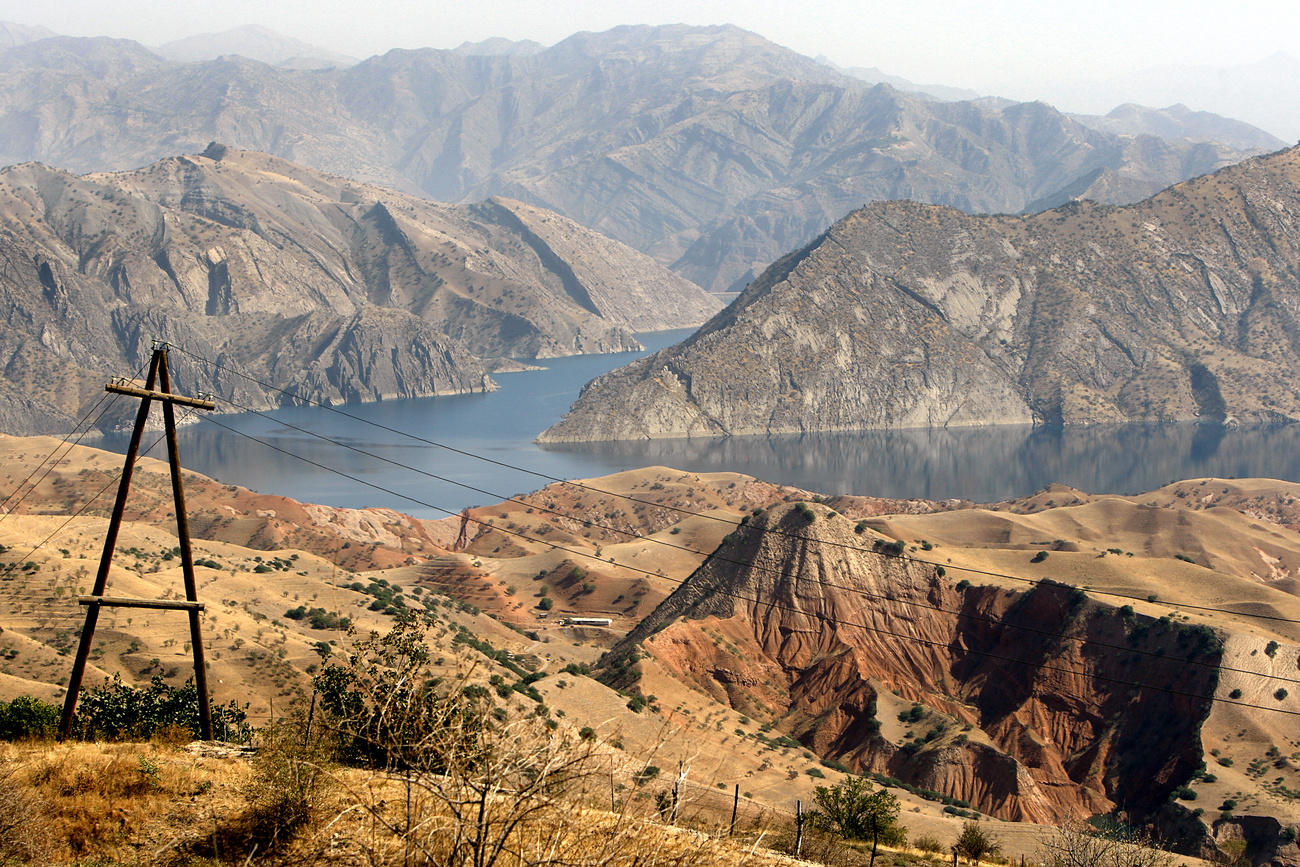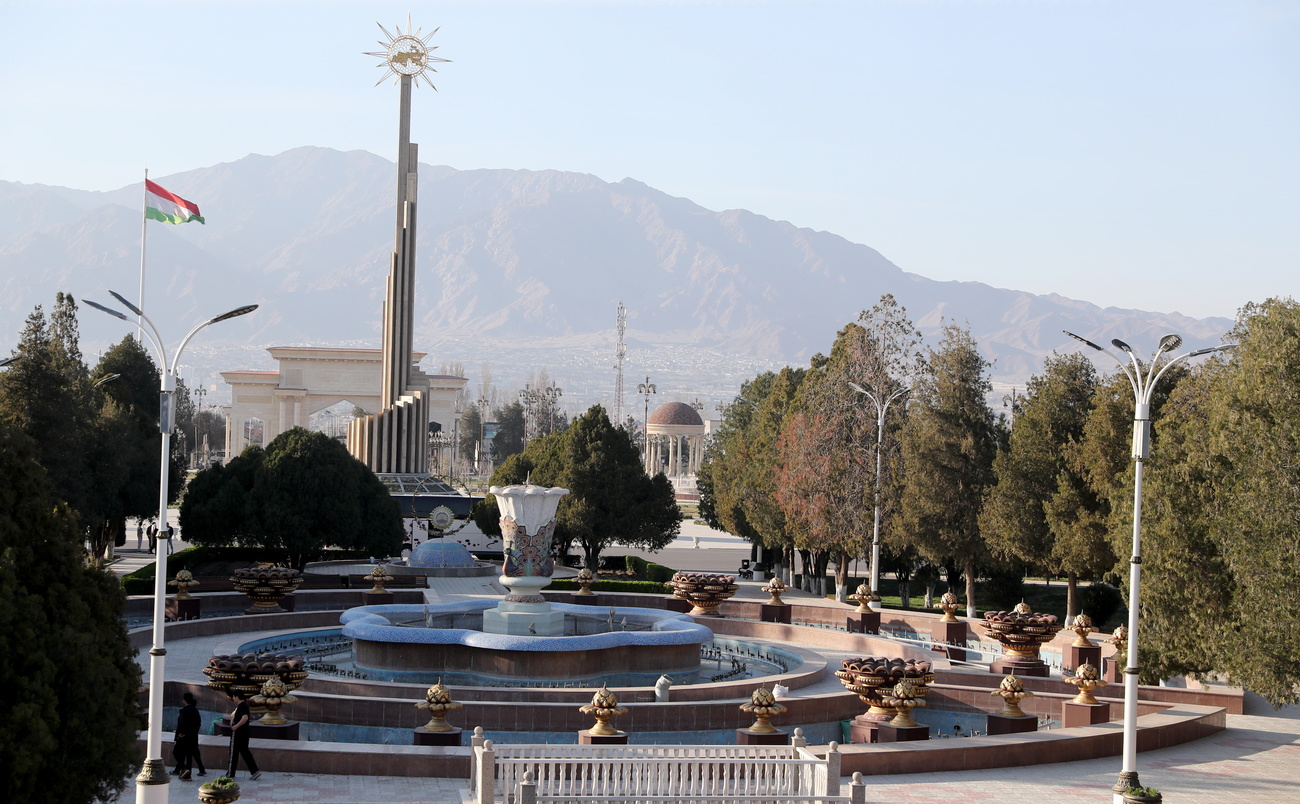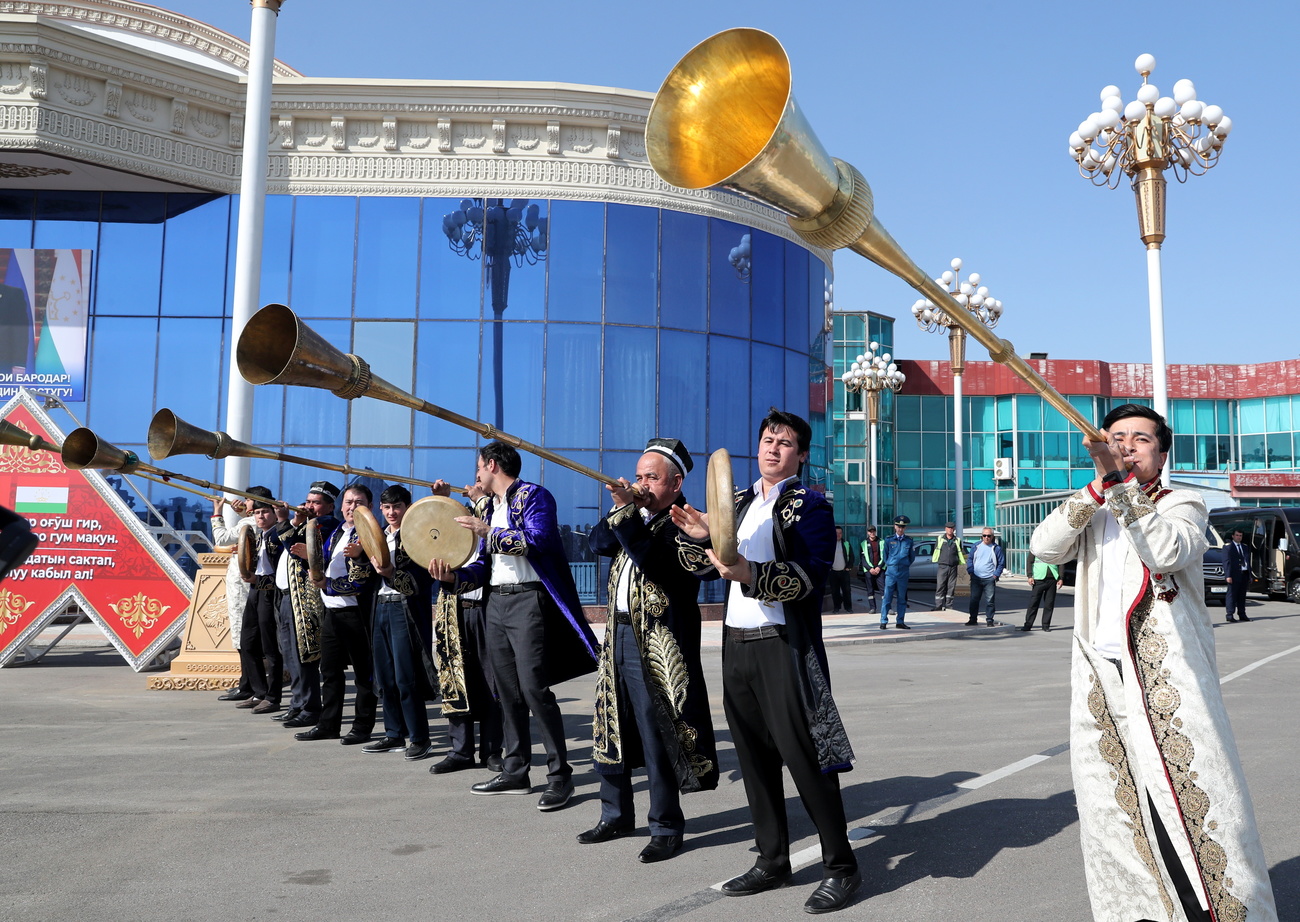
Promoting democracy in authoritarian Tajikistan – is Switzerland making a difference?

While the government of Tajikistan’s long-standing dictator grows more repressive, Switzerland continues to support human rights and digitalisation – a delicate balancing act.
This spring, for the first time, Tajikistan held parliamentary elections without independent, international observersExternal link. As in previous elections, the process was marked by irregularities. The country’s largest opposition party has been banned for a decade.
Tajikistan, a Central Asian country with around ten million inhabitants, has been a focus of Swiss development cooperation for 25 years. Nearly one in ten people there has access to water thanks to Swiss-funded projects. From basic services to broader social initiatives, some projects have had a tangible impact.
According to a spokesperson for the foreign ministry, Switzerland played a key role in passing a domestic violence prevention law and helped establish a free legal aid service for marginalised populations.
Between 2022 and 2025, Switzerland will invest CHF20 million ($24.2 million) in projects in Tajikistan focused on governance, human rights and public services. But as in other authoritarian regimes, this raises difficult questions about whether providing development aid ultimately shores up the power structure it hopes to reform. After all, good governance is just as important for dictatorships as it is for democracies.
A recent briefing on Switzerland’s engagement in Tajikistan says that the “principles of good governance and the effective delivery of public services” are “the key indicators of a democratic society.”
Tajikistan’s ruler since 1994 is Emomali Rahmon. The country has long been considered an authoritarian state – and the situation regarding civil liberties and human rights continues to deteriorate.
In 2022 and 2023 alone, more than 700External link NGOs were dissolved in Tajikistan. During so-called “anti-terror operations”, the government has the legal right to shut down the internet and block telephone access. Many human rights defenders and journalists are in prison – including lawyer Manuchehr KholiqnazarovExternal link, who was awarded a human rights prize in absentia in Geneva in 2024. Tajiks abroad who criticise the government report being threatened, while their families at home face intimidation.
The regime’s crackdown is growing harsher
Among Switzerland’s projects are initiatives to digitise public administration and human rights grants worth CHF2 million, intended for NGOs and independent media. But those familiar with the country question whether there are any such organisations left to support.

SWI swissinfo.ch last reported from inside the country in 2008. Even then, local experts agreed to speak only under condition of anonymity. In 2015, the opposition leader was assassinated in IstanbulExternal link – and his party outlawed.
The country’s ruler has remained Emomali Rahmon throughout – and even though he is now preparing a transition of power, the Rahmon name is likely to endure.
Rahmon’s successor will be his son and, according to anthropologist Till Mostowlansky, his father wants to leave him a “tidy country, free of political opposition and with as little dissent as possible”. Mostowlansky, a research professor at the Graduate Institute in Geneva, describes it as a kleptocracy which is now set to become a family dynasty.
Following the collapse of the Soviet Union, Tajikistan declared independence in 1991. A civil war soon erupted, lasting until 1997, after which the country embarked on a peace process. “The peace agreement guaranteed the opposition’s participation – despite the absence of free elections,” explains Mostowlansky. But after a brief opening in the early 2000s, the opposition was sidelined entirely.
Mostowlansky doubts Rahmon ever intended to bring democracy to Tajikistan. Since Russia’s annexation of Crimea and the outbreak of war in eastern Ukraine in 2014, suppressing political opposition has once again become geopolitically “acceptable” in the region.
The US has been losing influence in Tajikistan for a long time, where many migrant workers go to Russia for work. The money they send back to their families is a vital part of the economy in one of Central Asia’s poorest countries.
More
The other major economic player in Tajikistan is China, which, according to Mostowlansky, seeks to deepen its ties with the country. In 2025, it was China – also authoritarian – that sent election observersExternal link to legitimise the deeply questionable election.
A lengthy list of UN criticisms
Until 2019, Mostowlansky travelled regularly to Tajikistan. As an anthropologist, he worked primarily in rural areas – especially the mountainous Gorno-Badakhshan region.

In 2022, unrest broke out in Gorno-Badakhshan and security officials killed 25 protestersExternal link. The government has since sealed off the region, which accounts for more than 40% of Tajikistan’s territory.
Mary Lawlor, the United Nations Special Rapporteur on the situation of human rights defenders, was denied access during her visit.
Lawlor didn’t see Gorno-Badakhshan. Nevertheless, her March 2024 country reportExternal link is devastating. According to the report, in Tajikistan, simply using the term “human rights defender” is seen as suspicious.
“NGOs and human rights defenders are generally not able to operate freely in Tajikistan,” the report says. Many are women – and smear campaigns use fake or explicit content to ruin their reputations.
The government frequently links advocates of religious freedom to terrorist activity. Support for LGBTQ+ rights is tightly restricted. And 18 government agencies have the legal right to block websites without judicial oversight or a court order.
Lawlor’s report describes a judicial system marked by arbitrariness. “Trial dates are often communicated only 30 minutes before the hearing,” it notes, with many proceedings held in secret or inside detention centres. The judiciary lacks independence, with many judges “poorly trained and inexperienced” and pressured by the government. Corruption is “widespread”, the report continues.
Despite the stark findings in her report, Lawlor’s recommendation is clear. She calls on the international community to establish “formal and informal links with human rights defenders and NGOs in Tajikistan”. For this, the report notes, it is necessary to provide “sufficient funding for the regular activities of human rights organizations, instead of focusing mainly on specific projects”.
“The country gets little attention internationally,” Lawlor writes – and that means little consideration, and even less protection for those defending human rights.
The UN Special Rapporteur’s report raises serious questions about Tajikistan – and Switzerland’s human rights grants seem to align with its recommendations.
The dangers of digitalisation
Switzerland’s involvement in Central Asia is also linked to its leadership of a voting group at the World Bank and International Monetary Fund which include Tajikistan and other countries from the region. Poland is also a member of this group, informally known as “Helvetistan”.

Ludwika Wlodek, a sociologist and journalist, is an assistant professor at the University of Warsaw. She regrets that Poland, which entered into economic and academic cooperation agreements with Tajikistan in the early 2000s, has “since withdrawn from the country”.
Wlodek last visited Tajikistan ten years ago, where she observed that journalism was severely restricted. Since then, she has followed the situation through close contact with Tajik emigrants and refugees in Poland.
Wlodek has clear recommendations for development cooperation in Tajikistan: minimise co-operation with the government and prioritise collaboration with local communities.
She emphasises that many Tajiks lack basic necessities. “There are regions in Tajikistan where people don’t even have toothbrushes or basic dental care.” This especially affects regions where women are in the majority, because the men have emigrated in search of work.
Asked about the digitised civil registry and the digitisation of public services, Wlodek is sceptical. Such systems might simply allow the government to monitor the population more closely, she says.
Making the state more transparent
By 2028, Switzerland is set to spend CHF9.2 million ($11.05 million) on the digitalisation of public services in Tajikistan. Between 2020 and 2025, it invested CHF4.74 million to support the Tajik justice ministry in developing a digital civil registry.
According to the Swiss foreign ministry, the aim is to provide the population with affordable, high-quality public services while collecting “reliable and critically important statistical data for the state”.
Switzerland and the UN Development Programme (UNDP) say the digital system enables people to “protect and assert their rights to schooling, healthcare, child support, migration, and even voting”.

But can digitalisation really empower individuals in a highly authoritarian system? A spokesperson for the Swiss foreign ministry argues that “digitalising public services can encourage citizen participation and support their rights by making services more efficient, accessible, and transparent”. Standardisation also helps make public services “less prone to corruption”, the spokesperson adds.
Citizens would have easier direct access to their personal data, helping to prevent its manipulation. As a result of the reform, 98% of children are now officially registered, which gives them access to education and healthcare. In terms of elections, the foreign ministry says digitalisation helps to ensure that “everyone is included in the electoral process.”
Could Swiss development aid backfire?
During his visits to the country, anthropologist Till Mostowlansky found that administration was “extremely paper based”. He sees a potential for digitalisation to improve efficiency, but stresses that Switzerland must ensure that the technology is not misused.

In general, Mostowlansky emphasises the diplomatic dimension of Switzerland’s involvement. “Development cooperation has always been a form of diplomacy used to establish and maintain bilateral relations,” he explains, pointing to the concrete interests that Switzerland has been pursuing with “Helvetistan”. The group has been part of Swiss foreign policy since its creation in 1992.
The spokesperson for the Swiss foreign ministry says that Switzerland “regularly raises its concerns about the human rights situation in Tajikistan in bilateral meetings as well as in multilateral forums such as the Human Rights Council and OSCE”.
In 2011, then Swiss Foreign Minister Micheline Calmy-Rey hosted talks on human rights in Bern with her Tajik counterpart, Hamrokhon ZarifiExternal link.
Calmy-Rey has long since retired. But in early 2025, Zarifi was sentenced to 27 years in prisonExternal link for an alleged coup attempt in a treason trial that was closed to the public.
In 2025, as in 2011, power in Tajikistan lies with Rahmon. With the treason trial, the long-time leaderExternal link may be signalling others not to challenge his rule.

More
Our democracy newsletter
Edited by Giannis Mavris/adapted from German by David Kelso Kaufher/sb

In compliance with the JTI standards
More: SWI swissinfo.ch certified by the Journalism Trust Initiative






























You can find an overview of ongoing debates with our journalists here . Please join us!
If you want to start a conversation about a topic raised in this article or want to report factual errors, email us at english@swissinfo.ch.